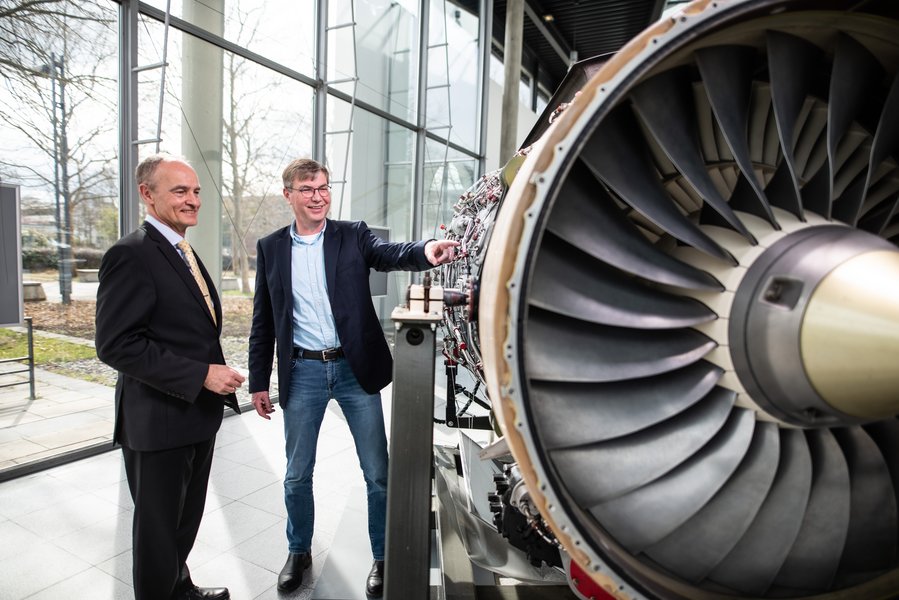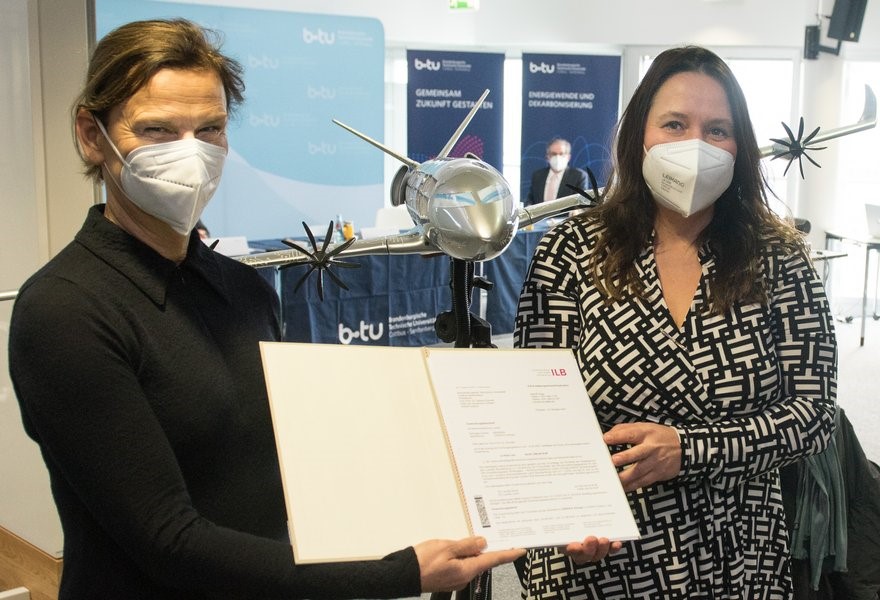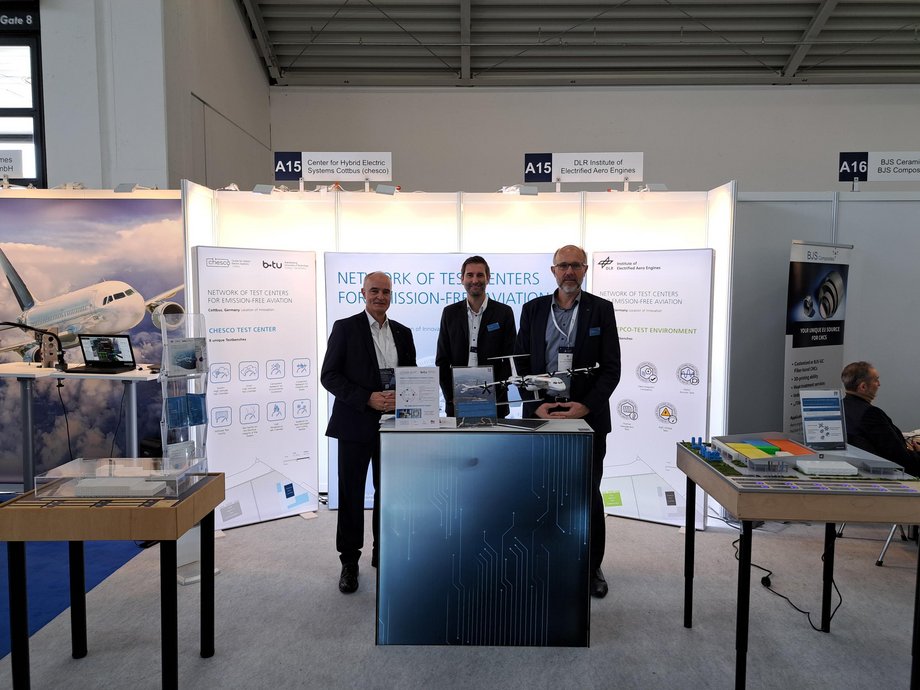
Eligibility for funding for BTU projects confirmed at federal level.
Chesco and research partners have mastered the first stage in the new call for applications for the federal government's aviation research program and impressed with their research outlines. click here
------
Navigating the future: Sustainability, innovation, collaboration! was the motto of the 14th Aviation Forum Munich 2024. Europe 's leading conference for the aviation industry with a large, central exhibition took place on November 26 and 27, 2024 at the Munich Trade Fair.
Under the patronage of Jürgen Westermeier, CPO Airbus, around 130 exhibitors and sponsors and over 900 participants (C-level, senior management) from the global value chain as well as buyers and supply chain managers from Airbus, Boeing and other OEMs and Tier-n suppliers met.
------

Hybrid flying: BTU receives nearly 39 million euros for CHESCO
Go-ahead for the establishment of a center for the development of low-emission air drives in Cottbus: Minister Schüle hands over the first ILB notification to BTU President Grande / 238 million euros are available until 2026
Starting signal for the CHESCO project within the framework of the structural development of the Lausitz region: Brandenburg's Minister of Science and Research, Dr. Manja Schüle, today handed over a grant notice from the Investitionsbank des Landes Brandenburg (ILB) for around 38.56 million euros for the "Center for Hybrid Electric Systems Cottbus" (CHESCO for short) project to the President of the Brandenburg University of Technology Cottbus-Senftenberg, Prof. Dr. Gesine Grande. This means that the establishment of a center for research into hybrid-electric drives and systems can begin at the BTU. In the future, climate-friendly flight propulsion systems for short- and medium-haul flights will be planned, tested and implemented in the research and cooperation center. The presentation of the project was attended - in addition to Minister Schüle and BTU President Grande - by CHESCO project leaders Prof. Dr.-Ing. Klaus Höschler and Prof. Dr.-Ing. Georg Möhlenkamp, as well as Dr. Jörg Au, Chief Engineer Business Aviation and Engineering Director Rolls-Royce Germany.
Science and Research Minister Dr. Manja Schüle: "CHESCO is a mega project for Lusatia. Here, cutting-edge research is tackling one of the greatest challenges of our time: the development of climate-friendly aircraft engines. And: CHESCO can become a pull factor for the entire region. The center will not be a hermetically sealed ivory tower in which excellent minds work away in silence. CHESCO wants to provide concrete answers: with the region, but beyond it. The center is to become a hub for cooperation projects with regional business partners, researchers and scientists in co-working spaces. Here we benefit from the existing structures of the BTU, from whose ranks the project has emerged. In Cottbus, we already have an outstanding science location with the necessary management know-how, a proven infrastructure and a constantly developing regional and international network. And in Rolls-Royce, we have an excellent partner in the field of electric drives - to highlight just one of the many strong players. CHESCO will be an innovation laboratory and transformation hotbed in the heart of Lusatia. I am convinced that it is not those who invest in industrial jobs, but those who invest in innovation, who invest in the future."
BTU President Prof. Dr. Gesine Grande: "At the BTU, we are researching the mobility of the future.Hybrid-electric aero engines are an important building block for further reducing harmful emissions. At CHESCO, renowned scientists are working together with international partners in the future Lausitz Science Park on innovative technologies that can sustainably change the aviation and vehicle industries and thus reduce the consequences of climate change."
Prof. Dr.-Ing. Georg Möhlenkamp, head of BTU's Department of Power Electronics and Drive Systems: "Electric motors are very efficient and powerful. In the foreseeable future, only smaller aircraft with up to four passengers will be able to fly under a range of 200 kilometers purely on electric power. Compared to kerosene, the energy density of batteries available today is still too low to power larger commercial aircraft during medium-haul flights. In addition, these designs will reduce noise for people on the ground. They will hardly hear the machines in the air."
Prof. Dr.-Ing. Klaus Höschler, head of BTU's Flight Engine Design department, says: "Until now, gas turbine engines in conventional aircraft provided both power generation and thrust. With hybrid-electric engines, it is possible to decouple these processes. This results in innovative design possibilities. The turbines no longer hang under the wings but can be housed inside the aircraft, and thrust is generated by electrically driven propellers. For additional propulsion, for example during takeoff, battery-powered electric motors can be connected to propellers that can also recuperate electrical energy during descent."
Dr. Jörg Au, Managing Director Engineering, Rolls-Royce Germany: "We are looking forward to building a globally unique industrial ecosystem for low-emission, hybrid-electric aircraft engines here in Brandenburg together with other partners. The fact that we can count on the continued support of the German government and the state of Brandenburg in this endeavor is instrumental in helping us meet our goals for a sustainable and CO2-neutral future by 2050. Building on the excellent capabilities of our Electrical teams in Bavaria and Brandenburg, the establishment of development, test and production facilities in Dahlewitz and Lusatia will enable us to deliver hybrid-electric propulsion systems for the next era of aviation."
Heiko Jahn, Managing Director of Wirtschaftsregion Lausitz GmbH (WRL), said, "CHESCO is the largest project qualified to date in the workshop process of Wirtschaftsregion Lausitz GmbH. Such a center for the development and testing of low-emission drives is so far unique in Europe. It contributes to the development of a modern and innovative scientific landscape in Lusatia and - also in the context of the planned Science Park at the BTU - will develop into a magnet for further science-related and entrepreneurial settlements. This also fulfills a goal of the Development Strategy 2050."
Within the framework of the "Center for Hybrid Electric Systems Cottbus" (CHESCO), BTU scientists led by Prof. Dr.-Ing. Klaus Höschler and Prof. Dr.-Ing. Georg Möhlenkamp will work on solutions for propulsion systems for aviation, as well as for rail, road and off-road applications. Hybrid-electric drives - and thus the combination of gas turbine with generator or fuel cell, battery and electric motor - enable a variety of different drive systems. New aircraft designs for short- and medium-haul traffic could significantly reduce emissions of climate-damaging gases in the future. Scientists expect savings of 20 to 30 percent. But developments in aviation are lengthy and technological changes are subject to high safety standards. CHESCO aims to accelerate the development time of innovative propulsion technologies by centrally pooling research and manufacturing expertise: A scientific facility, the Research Center, is used to develop the design of components and systems. In the Fast-Make Electrification Research Center (f-merc), researchers create prototypes that are tested in the Test Center. In cooperation with the Institute for Electrified Aerospace Propulsion Systems of the German Aerospace Center (DLR), several Fraunhofer institutes and industrial partners such as Rolls-Royce Germany, an integrated research center will be created in the Technology and Industrial Park in the north of Cottbus by 2026. In the future, up to 400 employees will work at CHESCO.
CHESCO is being financed through the Brandenburg State Chancellery's Structural Development Lusatia funding guideline, with funds coming from the federal government's Structural Strengthening Act. As part of the funding process, the project went through a workshop process organized by the state structural development company "Wirtschaftsregion Lausitz GmbH". In June 2021, the eligibility of the CHESCO project was confirmed by the interministerial working group (IMAG) Lausitz of the state government. Over the next five years, a total of 238 million euros is to be invested in building and equipping the research center. The Investment Bank of the State of Brandenburg (ILB) has now approved the first sub-project with around 39 million euros and issued the funding notice.
Fulbright | Call for Travel Grants 2021-2022
For the American academic year 2021/2021, the Fulbright Commission is offering travel scholarships to study in the USA. The funding is aimed at German BTU students (Bachelor from the 4th semester, Master from the 1st semester) who arrange and (partially) finance their study visit to the USA via a German-American university partnership programme. The scholarship benefits include 2,000 euros as a travel allowance, participation in preparatory and networking meetings of German and American Fulbright scholarship holders and admission to the international Fulbright network.
The application deadline at the BTU International Relations Office and the Fulbright Commission is 15 February 2021.
You or interested students can find detailed information about the programme and the application modalities here: https://www.fulbright.de/programs-for-germans/studierende-und-graduierte/reisestipendien
News
No news available.

